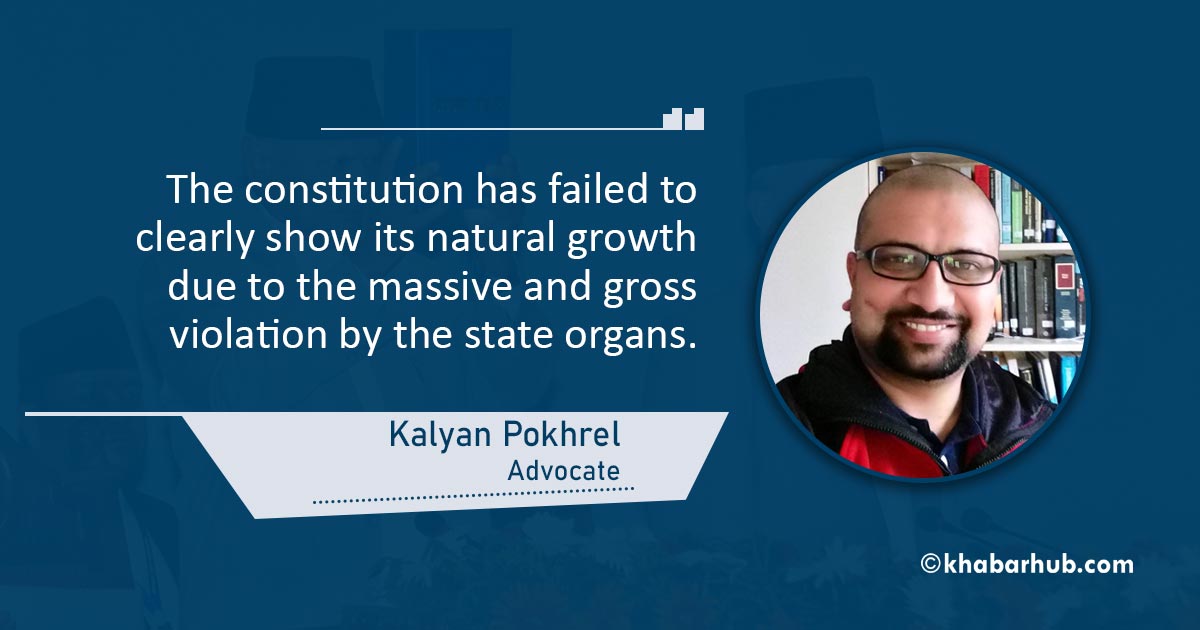0%

The infant constitution has completed four years but has not clearly shown its natural growth because of the massive and gross violation by the state organs.
Neither executive nor legislator or the judiciary is sincere to comply with the words, sprits, and ideals of the constitution. After the formation of a government with a two-thirds majority, all state organs are paralyzed from fear of such majorities so that there are rumors in the Nepalese people that this constitution will have to face an untimely death like other previous Nepali constitutions.
The experience of other jurisdictions where the constitution has been promulgated and enforced for more than a century or even more shows that the constitutions have got life longevity from the vibrant discussions between and within the multiple stakeholders, including the state and the peoples, and strict observance of the constitution by them in words and sprits of the constitution.
All political parties, civil societies, academicians, print and electronic media and even international communities have been accepting all constitutional and legal violation in the name of “political consensus” more than 13 years.
However, in the near future, vibrant discussions and strict observance of the constitution do not seem possible in Nepal. The opinions, behaviors and attitudes of the influential politician, bureaucrats, crony capitalists and peoples compelled us to believe that all Nepalese citizens except poor and vulnerable are above the constitution.
Even the politicians claiming this constitution as their brainchild are happy enough to violate the constitution from the date of conceiving.
All political parties, civil societies, academicians, print and electronic media and even international communities have been accepting all constitutional and legal violation in the name of “political consensus” more than 13 years.
Consequently, corruption has been institutionalized from the federal level to the local level. The elected representatives are not working for the betterment of the people’s life and livelihood, but are concentrating on the undue benefits for themselves from the state apparatus.
For this, the governments have to collect more taxes for the general expenses of the country so that the people’s expectation of development and quality livelihood after the promulgation of the constitution through constituent assembly remained unfulfilled.
The parliament at federal to the local level is the real place of lively discussion about people’s issues and implementation of the constitutionally guaranteed human rights and fundamental freedom. There is a dominant position of the Nepal Communist Party — the ruling party in the federal government — the most of the provincial and local level government so that the shadow of the party could be easily seen in the parliamentary practices.
The opposition’s voices are also found to be muted because of their direct and indirect involvement in corruption and malpractices. As a result, the parliament which is considered as the best place to make government accountable has failed to do its job properly so that the government has been undermining the parliament and the people’s sovereignty.
The judiciary is also equally found to be responsible for the current state of the constitution. Cases concerning the constitutional issues have failed to be disposed of within the spirits of the constitution so that such cases have to wait for the longer period of time.
Besides this, around 30 thousand cases are still pending before the Supreme Court and if those cases are heard at the current pace, then it will take 10 years for the finality of such case. According to Supreme Court’s annual report, even if the people get justice from the Supreme Court, it is hard to materialize within the prescribed time frame, because the enforcement ratio of the judgments is only on and around 20 percent of the total cases.
The news of rampant corruption and judicial mismanagement has also wiped out the credibility and reputation of the judiciary. If we do not address corruption and mismanagement issues within the judiciary properly, it is certain that Nepal will be the failed state.
The failure of each and every state organ to abide by the constitutional provision according to ideology, ideals, and sprits of this constitution is also destined to have the same fate as the previous constitution, and for the Nepalese people, this constitution is nothing but another piece of constitution book.
(Kalyan Pokhrel is an Advocate)
Views expressed in this article are the author’s own and do not necessarily reflect the stance of Khabarhub.